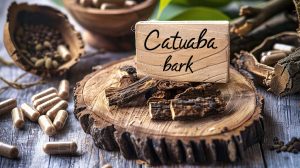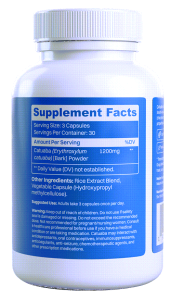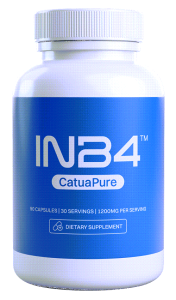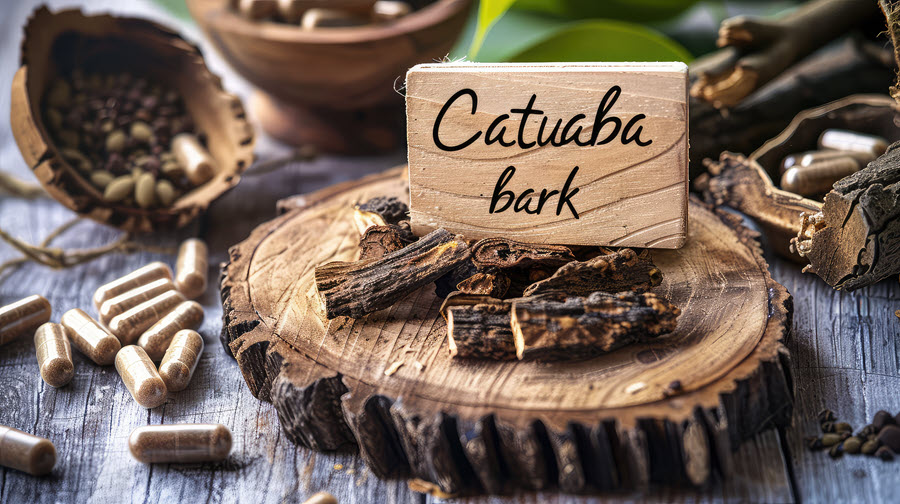Table of Contents
Key Takeaways
- Catuaba Bark (Erythroxylum catuaba) is a traditional Brazilian remedy now recognized as a natural nootropic.
- It works by boosting dopamine, acetylcholine, and serotonin activity, while reducing inflammation and oxidative stress in your brain.
- Benefits include better memory, focus, mood, energy, stress resilience, and libido.
- Clinical studies support its role as a neuroprotectant, adaptogen, and sexual health enhancer.
- Best results come from high-quality supplements made from Erythroxylum catuaba and tested for purity, such as INB4 CatuaPure™
Catuaba Bark – Nootropic for Memory, Focus & Libido
Catuaba bark (pronounced Cat-ooh-ahh-bah) is herbal remedy and nootropic that comes from the bark of Trichilia catigua found in the rainforests of Brazil.[i]
 Catuaba was traditionally brewed as a tea and is commonly used in Brazilian folk medicine for a variety of health issues. Having been used for centuries as a brain tonic, to improve mood, and as a libido enhancer.[ii]
Catuaba was traditionally brewed as a tea and is commonly used in Brazilian folk medicine for a variety of health issues. Having been used for centuries as a brain tonic, to improve mood, and as a libido enhancer.[ii]
Modern research now confirms what Tupi Brazilian healers have known for generations, providing strong evidence of its nootropic benefits.
Clinical studies have evaluated the effects of Catuaba bark extracts. And these studies demonstrate that Catuaba (Trichilia catigua) provides neuroprotective, pro-memory, anti-fatigue, and libido-enhancing effects.
Unlike stimulants, Catuaba doesn’t cause a crash when it wears off. Instead, it supports dopamine, acetylcholine, and norepinephrine tied to motivation, focus, and a better sex life.
In this review, you’ll learn exactly how Catuaba bark works in your brain, the science behind its benefits, recommended dosage, potential side effects, and how to choose the best Catuaba brand.
What is Catuaba in Traditional Brazilian Medicine?
Catuaba is the common name given to several Amazonian plants. In this review I’m focusing on Erythroxylum catuaba, a medicinal plant and small tree native to Brazil.
 For centuries, Catuaba bark preparations have been used in Brazilian folk medicine by the Tupi natives in South America and the Amazon rainforest as a natural stimulant to treat the brain and body. Many of the active compounds are derived from the bark of Erythroxylum catuaba.
For centuries, Catuaba bark preparations have been used in Brazilian folk medicine by the Tupi natives in South America and the Amazon rainforest as a natural stimulant to treat the brain and body. Many of the active compounds are derived from the bark of Erythroxylum catuaba.
Tropane alkaloids are among the bioactive compounds found in Catuaba bark. Catuaba was traditionally used to reduce fatigue, sharpen memory, lift mood, and enhance sexual performance.[iii]
Catuaba is usually consumed as a powdered bark to make tea, or standardized extract form as a dietary supplement.
Studies show Catuaba can increase dopamine and acetylcholine activity, protect your brain against inflammation, and even act as an adaptogen to buffer the effects of stress.
Because multiple species share the name “Catuaba” (including Trichilia catuaba and Anemopaegma arvense), it’s important to make sure your supplement comes from Erythroxylum catigua, since that’s the source used in many clinical studies and what I am revieing in this post.[iv]
How Catuaba Works in the Brain (Mechanism of Action)
Catuaba works on several key neurotransmitter systems.
- Catuaba boosts dopamine activity. Dopamine is the neurotransmitter linked to motivation, alertness, memory, and mood. Studies show that compounds in Catuaba bark increase dopamine release without overstimulation. This may explain why users feel more motivated and alert without the “crash” that comes from stimulants.[v]
- Catuaba supports the acetylcholine system. Catuaba inhibits the enzyme acetylcholinesterase, which normally breaks down acetylcholine.[vi] The inhibition of acetylcholinesterase forces your brain to reuse the acetylcholine that is already present. More acetylcholine means better memory, learning, and concentration.
- Catuaba inhibits the activity of Monoamine Oxidase A (MAO-A). The MAO-A enzyme breaks down the catecholamines serotonin, dopamine and norepinephrine. By inhibiting MAO-A, Catuaba helps preserve higher levels of these potent neurotransmitters, supporting mood and resilience under stress.
Catuaba also acts on your hippocampus, the brain region most responsible for memory formation. Animal studies using mice suggest it improves recall and learning through this pathway.
The effects evaluated in animal models included improvements in cognitive function and stress response. Neuroprotective and antioxidant benefits from using Catuaba bark extracts are also shown in animal laboratory studies.
In vitro studies (in the lab) have demonstrated that Catuaba extracts possess antioxidant and enzyme-inhibiting activity.[vii]
The journal Revista Brasileira de Farmacognosia demonstrated the antioxidant benefits of Catuaba are due to antioxidants present in the bark including procyanidins and cinchocaines.[viii]
Catuaba also contains flavonoids, alkaloids, tannins, and polyphenols which provide neuron and cellular protection.
Catuaba is anti-inflammatory and an antioxidant. By reducing inflammation in your brain and protecting against oxidative stress, Catuaba helps improve brain function, has antidepressant benefits, and may slow age-related cognitive decline.[ix]
Finally, Catuaba interacts with dopaminergic mediated mechanisms, and opioid pathways that help reduce the sensation of pain.[x] This is why some users report feeling calmer with less pain and more physically relaxed after taking it.
 Catuaba Benefits
Catuaba Benefits
Cognitive and Mood Benefits
Catuaba helps increase activity of the neurotransmitter dopamine. More dopamine means better memory, motivation, focus, and mental energy. Helping you to stay productive and engaged throughout your day.
A study in BMC Complement. Altern. Med. shows Catuaba also supports acetylcholine, the neurotransmitter most involved in learning and memory.[xi] By preventing the breakdown of acetylcholine, Catuaba helps improve recall, concentration, and overall cognitive performance.
Research also shows that Catuaba can help with stress resilience. By reducing MAO-A activity, it preserves higher levels of dopamine and serotonin in your brain. This supports a more stable mood and makes you more resistant to anxiety and fatigue.
Together, these actions explain why many report feeling sharper, calmer, and more motivated when using Catuaba bark extract.
Physical and Neurological Benefits
Catuaba is a powerful neuroprotectant. A functional analysis of Catuaba shows it reduces inflammation in your brain and protects neurons from oxidative stress. This may help slow cognitive decline as you age and is particularly relevant in the context of neurodegenerative disease.
It also supports hippocampal activity, which is critical for forming and storing memories.[xii] Studies show that this effect helps strengthen both learning and recall.
Catuaba has also been examined as a treatment for stress-induced fatigue or cognitive impairment. Animal studies found it reduces fatigue after exercise and even improves grip strength.[xiii]
These studies also showed a reduction in recovery time following physical exertion Which suggests that Catuaba may help accelerate post-exercise recovery.
Compared to other adaptogenic herbs, some findings indicate Catuaba’s effects on fatigue and recovery are similar or even superior to other natural adaptogens, though more research is needed to confirm these results.
Sexual Health Benefits
Catuaba has a long history as an aphrodisiac in Brazilian folk medicine. Modern research supports this reputation. Animal studies and humans report that it increases sexual arousal and performance.
This action on mood, neurotransmitters, and blood flow may explain why Catuaba has earned its reputation for boosting both brain and sexual vitality.
Catuaba as an Adaptogen and Synergistic Herb
Catuaba acts as an adaptogen. Adaptogens help your body maintain balance when you are under stress.[xiv]
By modulating neurotransmitters like dopamine and serotonin, and by reducing inflammation, Catuaba helps you stay calm, focused, and energized even during demanding situations.
Its adaptogenic effects can be compared to those of Panax Ginseng and Rhodiola Rosea, both known for enhancing stress resistance, cognitive function, and reducing fatigue.[xv]
In Brazilian traditional medicine, Catuaba is often combined with Muira Puama. The combination of these herbs is particularly effective, as the two work together to improve mood, energy, and sexual vitality.
Modern science supports this synergy, showing that the combination may enhance both cognitive and sexual performance.
When using Catuaba, it is important to choose the most suitable extract type for your specific needs, as different extraction methods and solvent mixtures can affect the effectiveness and safety of the final product. More on this down in the “where to buy” section.
This makes Catuaba bark a unique nootropic. It not only boosts your neurotransmitters for sharper memory and focus. It also strengthens your resilience to stress and works well with other natural nootropics to improve overall performance.
Catuaba bark has also been shown to have microbial and HIV infection benefits although more research is needed.
 Why Catuaba and Muira Puama Work Better Together
Why Catuaba and Muira Puama Work Better Together
In Brazilian traditional medicine, Catuaba and Muira Puama are often paired as a mixture of the two herbs, used as a single tonic for brain health, energy, and sexual vitality.
Modern research now helps explain why this combination works so well. The intended benefits of using both herbs together are to maximize their synergistic effects for cognitive and sexual health.
Catuaba enhances dopamine and acetylcholine activity. This supports your memory, focus, motivation, and mood.
Muira Puama also boosts dopamine and norepinephrine, two neurotransmitters linked to energy, resilience, and sexual arousal. Together, they provide a broader range of cognitive and mood support than either herb alone.
Both herbs are considered aphrodisiacs. Catuaba increases sexual desire through dopaminergic and nitric oxide pathways. Muira Puama has long been used to enhance libido and performance, likely through its effects on norepinephrine and dopamine. When combined, they create a stronger boost in sexual vitality.
Catuaba and Muira Puama combined as an Adaptogen
Finally, both herbs show adaptogenic properties. Catuaba reduces fatigue and buffers stress through its anti-inflammatory and MAO-A inhibiting effects.
Muira Puama improves stamina and reduces physical exhaustion. Stacking them helps your brain and body perform better while under stress and helps maintain steady energy.
This explains why traditional herbalists, and now modern supplement formulators, often recommend using Catuaba and Muira Puama together.
Their synergy covers multiple neurotransmitters, reduces stress, and supports both cognitive and sexual performance.
Recommended Catuaba Dosage and How to Use
Catuaba is most often sold as a bark extract, powder in capsules, or as liquid extracts.
Most clinical studies with Trichilia catigua extract use a dose in the range of 200 mg to 400 mg per day. Some reports suggest higher amounts may be effective, but starting with a low dose is best if this is your first time trying this nootropic.
 In studies, the highest dose tested was associated with increased activity levels and some neuroprotective effects but use caution if this is your first time including this nootropic in your daily routine.
In studies, the highest dose tested was associated with increased activity levels and some neuroprotective effects but use caution if this is your first time including this nootropic in your daily routine.
If you are using powdered bark, a typical dose is 1–2 grams per day, often divided into two doses. Extracts are more concentrated, so a smaller dose is needed to achieve the same effect.
Always follow the instructions on the product label to ensure safe and effective use. But be sure to consult a healthcare professional if you are taking medications, or if you are dealing with some other health issues.
Side effects such as incoordination or motor impairment are more likely at high doses. Avoid exceeding the recommended dose.
Catuaba can be taken in the morning or early afternoon. Because it supports dopamine and acetylcholine, some people find it mildly stimulating. Taking it too late in the day could interfere with your sleep.
The onset of effects may vary. Some users notice an improvement in mood, energy, or libido within hours. For memory and neuroprotection, benefits may increase gradually with consistent use.
It is not necessary to cycle Catuaba, but some people prefer to take breaks after several weeks of daily use. This may help reset tolerance and ensures long-term effectiveness.
When using Catuaba, consider potential interactions with food which could cause stomach issues, and interactions with medications. And always read the product label for the manufacturer’s recommendations.
Catuaba Side Effects and Safety
Catuaba is considered safe and well-tolerated when used at recommended dosages and is naturally gluten free. Studies using standardized extracts of Trichilia catigua report very few side effects.
Most people do not experience problems when taking Catuaba. However, some users report mild restlessness or difficulty sleeping if it is taken too late in the day. This is likely due to its dopamine and acetylcholine-boosting activity.
Because Catuaba acts on neurotransmitters and inhibits MAO-A, it may interact with antidepressants, MAOIs, or SSRIs. If you are using prescription medication that affects serotonin or dopamine, speak with your healthcare provider before using Catuaba.
If you experience severe side effects, discontinue use immediately and see your doctor if you need to.
There is little data on long-term use, pregnancy, or breastfeeding. For this reason, you should avoid using this supplement unless it’s approved by your healthcare provider.
Overall, when taken at recommended doses, Catuaba has a strong safety profile and very few adverse effects.
Best Type of Catuaba to Buy
When you buy Catuaba, the most important thing is making sure you are getting the right plant species and a supplement that has been properly tested and examined for purity and authenticity.
Always check that your supplement is made from Erythroxylum catuaba. Other plants are sometimes sold under the name Catuaba, but many do not have the same clinical research backing their effects.
Also look for third-party tested products. This ensures your supplement is free from contaminants and contains what the label says. A good brand will also provide a Certificate of Analysis (COA) so you can verify purity and potency.
 You’ll find Catuaba sold in liquid extracts, powdered bark, and standardized extracts. Powdered Catuaba bark is closer to traditional use and typically taken in grams per day. Standardized extracts and liquid extracts are more convenient and usually effective in smaller amounts, around 200–400 mg per day.
You’ll find Catuaba sold in liquid extracts, powdered bark, and standardized extracts. Powdered Catuaba bark is closer to traditional use and typically taken in grams per day. Standardized extracts and liquid extracts are more convenient and usually effective in smaller amounts, around 200–400 mg per day.
When choosing a Catuaba supplement, consider which form is most suitable for your needs, whether you prefer the traditional powdered bark, the convenience of capsules, or the flexibility of liquid extracts.
I use and recommend INB4 CatuaPure™. This supplement uses Trichilia catigua bark and is third-party tested with HPTLC analysis to confirm authenticity.
INB4 CatuaPure™ also provides a Certificate of Analysis, so you know exactly what you are getting. Each serving of 3 capsules provides 1,200 mg of Catuaba bark with no unnecessary fillers.
Choosing a high-quality, tested supplement like INB4 CatuaPure™ is the best way to make sure you are getting the full nootropic and adaptogenic benefits of Catuaba.
Try Catuaba Bark here: Click for INB4 CatuaPure™







Join The Discussion - 6 comments
RODRIGO ARANDAS SOUSA
December 26, 2025
Hello David, I love your content, congratulations. Can I use Catuaba and Rhodiola Rosea together?
Rodrigo
Diadema, Brazil
David Tomen
December 26, 2025
Rodrigo, i’ve never tried it and don’t know anyone who has tried it. I don’t see a problem. It wouldn’t be dangerous. The worst that could happen is you feel like crap. Or it could work. Let us know if you try it.
Rodrigo Arandas
January 12, 2026
Thank you David for the tips. I have been using for 2 weeks a daily dose of 300mg of Catuaba and 300mg of Rhodiola Rosea with no negative symptoms so far, noticing improvements in energy, reduced fatigue and better mood and sexual appetite.
David Tomen
January 24, 2026
Thank you for reporting in Rodrigo.
Olmo
September 22, 2025
hello David,Recommend us a high quality and effective Muira Puama supplement, can I use ltyrosine with catuaba?
David Tomen
September 23, 2025
Olmo, this is about the best Muira Puama supplement I know of: https://geni.us/uNoC00j
And yes, you can use L-Tyrosine with Catuaba Bark.